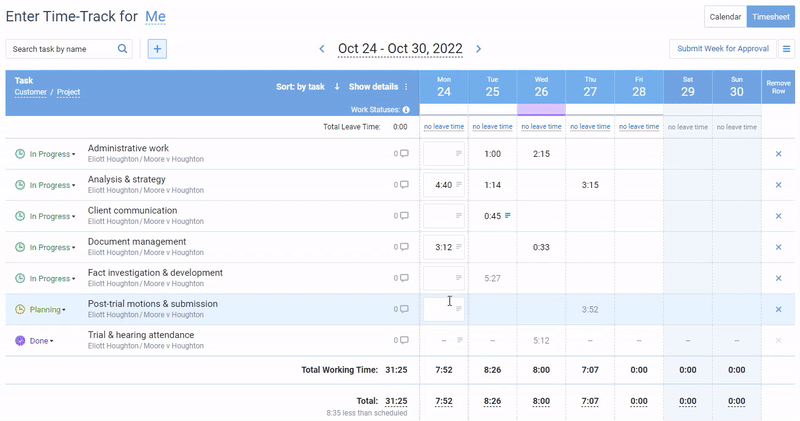
Are you looking to take your digital marketing skills to the next level? Perfect! You’re in the right place.
In this blog post, we’ll discuss 22 digital marketing skills – from essential to advanced – that will help you become a true expert in the field.
Whether you’re a budding digital marketer feeling lost and overwhelmed by the immensity of available information or a seasoned professional in need of just a little brush-up, this guide will give you an idea of how to become an expert marketer, endow your CV with an undeniable edge, and stand out from the crowd.
Get ready for a journey full of learning opportunities as we dive deep into the most comprehensive review of digital marketing skills out there!
Essential Digital Marketing Skills
1. SEO
There is a good reason why search engine optimization or simply SEO is at the top of this list – being able to effectively optimize websites and strategize keywords is the only possible way to ensure that your content ranks well on search engines and ultimately drives traffic to your sites.
As a digital marketer, it’s essential to apply the latest SEO techniques and tactics to enrich your online presence. And when doing that, you need to focus on the three core components of SEO at once:
- Technical SEO: The optimization of a website’s technical infrastructure and underlying code to improve its search engine ranking and visibility. This involves a comprehensive analysis of such factors as website architecture, URL structure, and website speed to ensure that search engine crawlers can easily access and understand the website’s content.
- On-page SEO: The keyword optimization of individual pages for search engines. It encompasses the work on such elements as meta tags, textual content, images, and videos placed throughout your website.
- Off-page SEO: All the activities that are carried out outside of the website to improve its search engine ranking. This includes link building, social media mentions, and even product reviews. These techniques aim to improve your website’s authority, credibility, and popularity, resulting in better search engine visibility and higher organic traffic.
2. Social media marketing (SMM)
With billions of people using social media every day, SMM is an incredibly effective way to approach existing and potential customers – it allows you to tap into a massive audience and build brand awareness by reaching your target market with creative and engaging content that resonates with consumers and allows for closer interactions with them.
Figuratively speaking, SMM is like the “cool kid” of the marketing world. And like that one popular kid from high school, it just knows how to gain attention and communicate with the audience effortlessly.
In a world where everyone is constantly scrolling through their phones, SMM is an essential skill that all modern marketers must possess. So, if you haven’t already, it’s time to join the cool kids’ table and master SMM.
3. Email marketing
Email marketing is a powerful strategy that helps to connect with customers in a more personal and engaging way. In sum, it’s about creating and sending targeted emails with promotional messages from your brand. However, it has to involve so much more to be successful.
Email marketing requires careful planning and diligent execution of a bunch of analytical and engagement-boosting activities:
- Crafting compelling subject lines
- Creating eye-catching designs
- Writing engaging content
- Segmenting your email list
- Testing and optimizing your campaigns
- Analyzing data to measure your results
With these practices in place, you can build strong relationships with your customers and subscribers, and encourage them to take action, which will ultimately drive sales and return on investment (ROI) in your company.
To excel at email marketing and make it as efficient as possible, you can apply automated tools like these:
- Mailchimp: A popular email marketing automation tool that offers advanced features like A/B testing, personalized emails, audience segmentation, and automated workflows. It also provides detailed reports that help you track your open and click-through rates.
- ActiveCampaign: A powerful email marketing and automation platform that helps businesses engage with their customers and grow their brands. With advanced features like marketing automation, CRM, and dynamic segmentation, it provides everything you need to create personalized and effective marketing campaigns that drive results.
4. Video marketing
Did you know that video marketing is considered to be one of the most desirable digital marketing skills these days?
It’s not surprising since video marketing allows businesses to effectively communicate with their audiences and build brand awareness in a relatively short time.
As such, video marketing involves creating and sharing videos that promote products, services, or entire brands. It involves:
- Creating compelling videos that resonate with your target audience
- Optimizing them for SEO
- Promoting them on various social media platforms
- Measuring the effectiveness of each video to drive improvement
Besides, it’s very useful to understand how to work well with YouTube and monetize your content there. Plus, you might want to explore the nuances of video production as this knowledge will provide you with more control over the entire process and help you create videos exactly as you planned and wanted them to be.
5. Search engine advertising (SEA)
SEA is a handy shortcut to getting noticed in a sea of online content. It’s a type of paid advertising that allows marketers to bid for ad space for their specific keywords on search engines like Google.
Overall, the competition for online attention is fierce, and ranking well organically isn’t easy. That’s why paid advertising is important – it offers a way to get ahead of the curve and make sure your message is seen by your audience without extra effort and time expenses.
6. Strategy and planning
A marketing strategy is a holistic plan that outlines a company’s goals, strategies, and tactics for achieving its desired outcomes. To make one, you need to identify a target audience, analyze the competition, and create a unique value proposition that differentiates your business from its competitors.
Planning, on the other hand, is the process of defining marketing objectives, identifying target audiences, creating marketing campaigns, and establishing metrics to measure success. And a well-planned marketing campaign will align with the overall marketing strategy of a business, reflect its values, and solve its customer’s pain points.
By knowing how to handle both planning and strategizing, you will have a good sense of direction and organize your marketing tactics and approach in the most efficient way possible.
7. Content management
Content management is an essential aspect of your job as a digital marketer. It involves planning, creating, publishing, and maintaining content that drives traffic, engages your audience, and generates conversions.
To help you streamline your content strategy and maximize your results, here are the top five content management activities that you should focus on:
- Content planning: Before creating content, you need to have a solid plan in place. This involves identifying your target audience, understanding their needs and pain points, and crafting a content strategy that aligns with your business goals. By mapping out your content ideas, you can ensure that you are delivering the right message to the right people at the right time.
- Content creation: Once you have a plan in place, it’s time to start creating content. This involves developing high-quality, engaging, and relevant content that resonates with your audience. From blog posts, videos, social media posts, and infographics, there are many types of content that you can create. The key is to ensure that your content is unique, valuable, and aligned with your overall marketing strategy.
- Content optimization: After creating your content, it’s important to optimize it for search engines and social media platforms. This involves using relevant keywords, meta descriptions, alt tags, and other tactics to improve your content’s visibility and search ranking. By optimizing your content, you can increase your organic traffic and improve your online presence.
- Content distribution: Once your content is ready, you need to distribute it across various channels to reach your target audience. This can include sharing your content on social media, email marketing, guest blogging, and other content distribution strategies. By amplifying your content across multiple channels, you can increase its reach and improve your brand visibility.
- Content analysis: Finally, it’s important to analyze your content performance to see what’s working and what’s not. This involves tracking metrics such as engagement rate, traffic, bounce rate, and conversions. By analyzing your data, you can identify areas for improvement and adjust your content strategy accordingly.
8. Data analysis
Data analysis allows digital marketers to extract valuable insights for making better decisions and aligning them with the set performance goals. You need to know how to analyze such data as customer demographics, behavior, and preferences, and use it to create more effective marketing campaigns and drive convertible traffic to your website:
Whether you’re a seasoned marketer or a newbie in the field, here are five essential data analysis activities that will help you boost your marketing game:
- Identifying your target audience: Gaining insights into your audience’s demographics, psychographics, and online behaviors will help you tailor your marketing strategies to communicate with them effectively.
- Analyzing customer feedback: Listening to customer feedback via social media, reviews, surveys, and other channels help you identify areas in which you can improve your products, services, and overall customer experience.
- Tracking website visitors: This will help you understand user behaviors and conversion rates, and identify areas in which you can optimize your website to drive more traffic and leads.
- Analyzing marketing campaign performance: Track key performance metrics like conversion rates, click-through rates, and ROI to gauge the effectiveness of your marketing campaigns.
- Competitive analysis: Keeping an eye on your competitors’ marketing strategies, messaging, and positioning will help you stay ahead of the curve and identify new opportunities to differentiate yourself in the market.
Here are a couple of marketing automation tools that can help you to streamline data analysis, enhance your digital marketing strategies, and take your skills to the next level:
- Marketo: A cloud-based software that provides marketing automation solutions for businesses of all sizes. It enables you to create and manage landing pages, target segmented audiences, and track their engagement. Its highlight feature is its AI-based prediction engine, which helps you forecast and optimize your marketing campaigns.
- Hootsuite: A social media marketing automation tool that helps you manage, schedule, and analyze social media posts across different platforms. It enables you to target specific demographics, analyze audience engagement metrics, and manage multiple accounts in one place.
- Pardot: A B2B marketing automation tool that streamlines lead generation, scoring, and nurturing. It offers powerful features like dynamic content creation, social media integration, and AI-based analytics to help you create personalized content and prioritize high-quality leads.
9. Customer relationship management (CRM)
CRM is the ultimate tool for keeping track of your customers and their needs. It allows you to store and manage customer data, track their interactions with your brand, and even personalize your communication with them.
And why do marketers need this skill, you ask? Well, think about it. Understanding your customers is the key to unlocking their hearts and wallets. By using CRM, you can better anticipate your customers’ preferences, tailor your marketing messages accordingly, and ultimately build stronger and longer-lasting relationships with them.
Thus, if you want to really understand your clients and communicate with them more effectively, mastering CRM is the way to go.
Here’s a list of reliable CRM systems that have been highly rated by industry experts and customers alike:
- HubSpot: A highly intuitive and easy-to-use CRM system that is perfect for small to medium-sized businesses. It offers a wide range of features, including email marketing, lead scoring, and customer analytics.
- Zoho CRM: An affordable cloud-based CRM system that offers a wide range of features including lead management, contact management, and sales forecasting. It’s highly customizable and easy to use.
- Pipedrive: A highly visual platform that makes it easy to track leads, deals, and customer interactions. It’s perfect for sales-driven businesses with a focus on pipeline management.
Advanced Digital Marketing Skills
1. Project management
Project management guarantees that campaigns are executed efficiently and effectively. It involves planning workloads, organizing tasks, delegating responsibilities, and monitoring progress.
With project management as a core skill, digital marketers can ensure that their campaigns are completed on time, within budget, and meet the objectives set out at the beginning of the project. Moreover, with the right tools and techniques, project management can be a fun and rewarding experience.
Let’s take actiTIME as an example.
This multifunctional project tracking solution can be of great help to both individual marketers and entire marketing teams as it allows for accurate progress monitoring, more efficient resource management, and in-depth performance analysis.
actiTIME offers such basic project planning capabilities as task sorting, task descriptions, and workload allocation. Plus, it lets you log time spent on various project activities in a timesheet or calendar format and integrates with Time Management Assistant, a smart browser extension that automatically tracks every minute you spend online.
You can easily analyze results via visual charts and reports right in the extension or sync the collected data with your actiTIME account and review it from diverse angles there. Either way, this handy time tracking functionality makes it super easy to see just how many hours you’ve put into work on the project piece by piece.

In short, if you’re looking for a user-friendly solution that streamlines your workday and makes marketing project management a breeze, then actiTIME should be your #1 choice!
Sign up for a free online trial and check it out in action.
2. HTML
HTML or Hypertext Markup Language serves as the backbone of website development and design. It allows digital marketers to create well-organized and user-friendly web pages that any search engine will like.
Without a solid foundation in HTML, it can be difficult to optimize websites for SEO, track web traffic effectively, or make data-driven decisions. However, as a digital marketer, you don’t have to know HTML through and through.
Just start by learning the basics of CSS, the principles of HTML accessibility, and responsive web design. This may ultimately help you enhance your website’s user experience, resulting in better lead generation and conversion rates.
3. Social listening
Social listening is the process of monitoring and analyzing social media channels to understand what customers are saying about a brand. And by mastering social listening, you can gain valuable insights into customers’ pain points, desires, and preferences.
To succeed with this goal:
- Use automated social listening tools (such as Brandwatch, Awario, and Sprout Social)
- Analyze your competitors
- Keep an open mind to feedback
This will help you create a solid customer experience, build stronger relationships with customers, and capture the right opportunities for improving your products or services.
4. Experimentation
If a design element or a piece of content doesn’t bring the desired results, marketing experimentation is what can help you find out why. It’s all about testing and refining your website and campaigns, ensuring that you’re reaching and converting your target audience more effectively.
Whether it’s testing different ad creatives or targeting options, experimentation offers valuable insights into what resonates with customers and what doesn’t. And to successfully master this skill, it’s important to approach it with a structured and data-driven mindset.
Start by setting clear objectives and defining your key performance indicators (KPIs), then use data analytics and high-quality testing tools to measure the impact of different strategies. By adopting this approach, you will gain a deeper understanding of your customers and their behaviors and also gain a chance to advance your career.
Tools to consider:
- Optimizely: One of the most popular tools for A/B testing and experimentation, with more than 1 million users. It lets you create multiple variations of your page, test them against each other, and analyze the results to understand which version works best for your audience. It also integrates with various marketing tools such as Google Analytics, Salesforce, and Marketo to provide a comprehensive approach to marketing analysis.
- VWO: This top-tier tool offers its users enormous flexibility in terms of creating experiments, running A/B tests, and optimizing conversions. The platform supports multivariate testing, heatmaps, and advanced targeting options, allowing you to tailor site content to specific user segments. VWO also provides integrations with marketing automation tools and integrates with Google Analytics for more detailed insights.
- Google Optimize: A straightforward solution that allows non-technical teams to set up experiments, run tests, and analyze reports with ease. It integrates with Google Analytics to help you make data-driven decisions while optimizing your website for conversions.
5. Influencer marketing
In a nutshell, influencer marketing refers to the practice of partnering with influential individuals (i.e., influencers) to promote a brand’s products or services in front of their large audience on social media platforms.
Influencers come in different shapes and forms, and they can be anyone with a substantial following on social media, including celebrities, bloggers, vloggers, YouTubers, Instagrammers, and TikTokkers. They have built a loyal fan base that trusts their opinions and recommendations, and that’s exactly what makes them highly valuable to brands and marketers.
The activities involved in influencer marketing can be diverse and tailored to the specific needs of each brand or campaign. However, some of the most common ones include:
- Identifying the right influencers for your brand: Conduct thorough research to find influencers who align with your values, target audience, and marketing goals.
- Building relationships with influencers: Reach out to your potential influencers, establish a relationship, and propose a collaboration that is mutually beneficial.
- Creating content: Collaborate with your influencers to create content that resonates with their audience while showcasing your brand’s products or services. This can range from sponsored posts, product reviews, unboxings, tutorials, and more.
- Measuring results: Tack your results to determine the ROI and adjust your strategy if needed. You can measure the success of your influencer marketing campaign through such metrics as engagement rates, impressions, reach, and sales.
6. User experience (UX)
User experience (UX) is the overall experience that a user has while interacting with a product, service, or website. It considers the usability, accessibility, and overall satisfaction of the user depending on how they perceive and interact with your product or service.
Digital marketers need to understand UX because it has a huge impact on the overall impression one has from digital platforms. The better the UX, the more likely users are to remain engaged with a website or a specific piece of content, and ultimately, the more likely they are to convert over time.
Great UX starts with a deep understanding of your target audience, their needs, and their preferences. That’s why having an aptitude for data analytics is so important here.
As a UX marketing specialist, you must aim to create maximally helpful content for your audience and make it simple to access and navigate. Visual appeal is vital for good UX too. Thus, you need to understand how to apply fonts, patterns, graphics, color psychology, etc. to invoke the right emotion in content consumers and engage them through a delightful aesthetic experience.
7. Data visualization and design
Design isn’t just about making things look pretty – it’s about crafting visuals that communicate your message effectively.
As a digital marketer, it’s essential to understand how design can be used to evoke emotions, build trust, and create a lasting impression on your audience. Plus, having some design skills in your toolkit will make you less reliant on a graphic designer for every little task – this will save time and money and rid you of lots of headaches when you’re working under tight deadlines.
Soft Skills for Digital Marketing
1. Time management
Time is precious and its flow is irreversible. That is why you’ve got to use this resource wisely whether you’re putting together a social media strategy or crafting the perfect email campaign.
If you’re not keeping your schedule in check, you could find yourself drowning in a sea of deadlines, meetings, and endless to-do lists. But fear not! With a little bit of planning, prioritization, and control, you’ll be well on your way to becoming a time management wizard.
The best way to start? Adopt actiTIME – a handy tool that helps to stay in charge of your hours and make them work for you.

actiTIME allows you to effortlessly track your time and monitor project deadlines, making sure you’re on top of your game. Plus, it includes a client billing functionality that converts the tracked hours into detailed invoices that look like they were made by a pro.
And let’s not forget the best part of it all – with actiTIME, you’ll have access to a ton of valuable productivity data that will help you become a master of time management.
Trust us, your future self will thank you for trying actiTIME. So, sign up for a free 30-day trial now and give it a whirl.
2. Communication
In today’s fast-paced world of tweets and texts, it’s more important than ever to be able to effectively convey your message. And as a digital marketer, you need to not only be able to provide concise and engaging content that will capture the attention of your target audience but also clearly articulate your ideas and strategies to both clients and team members. After all, good communication is crucial not only for cocktail parties or chatting with friends, it’s integral to success in any work environment.
And let’s not forget about the importance of listening skills – it’s a part of effective communication too! Understanding the needs and wants of your audience is crucial to creating successful campaigns.
3. Creativity
Digital marketing is the field where your success is only guaranteed if you stand out from the competition creatively. But if you can’t showcase your brand in a new, exciting way, your audience is bound to get bored and shift their attention elsewhere.
That’s why creativity is one of the vital digital marketer skills – you need to learn how to see things through a fresh set of eyes and come up with ideas that others haven’t thought of yet.
At the end of the day, the more creative you are, the more likely you are to make a real impact on your audience – and that’s what really matters in this game. Therefore, don’t be afraid to let your imagination run wild!
4. Adaptability
Marketing is a dynamic field that keeps on evolving with every passing day. And working as a digital marketer is like trying to hit a moving target – you need to be adaptable like a chameleon to ensure that your marketing strategies remain effective in the ever-changing digital landscape.
Imagine that you’ve spent weeks or months creating a campaign only to find out that it’s no longer effective because of the latest algorithm change or trend. What a bummer!
Adapting to changes quickly helps you cope with such problems more quickly and stay on the right track no matter the situation. Hence, if you’re in digital marketing, remember to keep those adaptability skills sharp!
5. Problem-solving
The digital world may appear to be a dreamland with never-ending possibilities. However, the truth is, it’s more like a labyrinth with different twists and turns that are challenging to navigate. That’s why digital marketers need to have fantastic problem-solving skills. It’s not just about being able to think outside the box but also identifying problems when they arise and quickly finding ways to tackle them before they get out of hand.
A good digital marketer is an excellent problem-solver that can see the big picture, identify numb spots, and make swift and informed decisions. Whether it’s a technical issue, a social media outage, or a sudden change in algorithms, digital marketers must be on top of their game and always have a trick or two up their sleeves.
6. Collaboration
It takes more than just one person to build a successful digital marketing campaign. From brainstorming ideas to implementing them, every step of the way requires collaboration with others.
That’s why it’s so vital for a digital marketer to know how to be a team player. Working with others, you can bring diverse perspectives and creativity to the table and then complete the planned work both faster and better – teamwork makes the dream work, indeed.
Conclusion
Digital marketing can be a huge challenge even for those of us with lots of experience and tech-savviness. After all, the most important and valuable digital marketing skills are the ones that take time and practice to develop.
You have to keep honing your abilities and stay informed on new trends and technologies to continue to see success in this ever-changing landscape. So, make sure to brush up on the abovementioned skills of a digital marketer, and let actiTIME help you with that!
Remember that with higher efficiency comes more time for learning and attaining your career goals – so sign up for a free actiTIME trial today and unlock the door to better time management.


















































